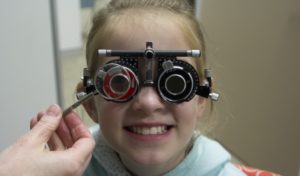Adult Cataract - Questions
Table of ContentsThe Main Principles Of Eye Exam 6 Easy Facts About Amblyopia ShownEverything about Comprehensive OphthalmologyThe Facts About Adult Cataract Revealed
Eye doctors are medical doctors that specialize in the medical diagnosis and treatment of eye as well as vision troubles. These three types of eye treatment experts have instead similar-sounding names and overlapping task summaries.They can not offer eye examinations, compose prescriptions, or diagnose or deal with eye problems. Give eye tests, vision testing, and also prescriptions for glasses or call lenses.
:max_bytes(150000):strip_icc()/optometrist-vs-ophthalmologist-5094869_final-0d8eca1d944a4b54b1423065ac2e780f.jpg)
Ophthalmologists diagnose and also deal with injuries, infections, diseases, and problems of the eye. Treatments can include medication taken by mouth (by mouth) or topically (in the eye), surgical treatment, cryotherapy (freeze treatment), and also chemotherapy (chemical treatment). Eye doctors go to clinical institution then obtain a number of years of specialized training in the clinical and medical treatment of the eye.
The Single Strategy To Use For Eye Exam
As they are the only physician that can deal with all eye conditions, ophthalmologists see a wide array of eye problems, including: How typically should you have an eye examination? What are signs that indicate you may have an eye problem that requires to be inspected by an eye physician? The American Academy of Ophthalmology recommends: As children's eyes are expanding as well as changing swiftly, they need to get a vision screening.
Adults that have healthy eyes and also excellent vision ought to have 4 thorough eye exams: one in their 20s, 2 in their 30s, and also one at age 40. These appointments might permit the ophthalmologist to catch an eye condition or vision modifications early on. By the time you see signs, you might already have some vision loss (ADULT & PAEDIATRIC EYE SURGERY).

People that are at a higher danger of eye condition may require to get an eye examination more usually. After age 65, your eyes ought to be examined every one to two years.
Your sight relies on seeing the best ophthalmologist at the correct time. When it's time to "obtain your eyes examined," ensure you are seeing the best eye treatment specialist for your needs. Ophthalmologists, eye doctors and also opticians each play an essential duty in providing eye like consumers. The levels of training as well as know-how are rather various for each type of carrier.
Eye Exam Things To Know Before You Get This

is a clinical or osteopathic medical professional that specializes in eye as well as vision treatment. Ophthalmologists vary from eye doctors and also lens in their degrees of training and also in what they can detect and treat (https://www.authorstream.com/drcrlinecatt/). As a clinical doctor that has actually completed university and at the very least eight years of added clinical training, an ophthalmologist is licensed to exercise medicine and also surgical procedure.
Numerous ophthalmologists are additionally associated with scientific study on the causes and also remedies for eye conditions as well as vision problems. SUBSPECIALISTS: EXTRA KNOWLEDGE AS WELL AS TRAINING FOR PARTICULAR EYE NEEDS While eye doctors are educated to take care of all eye troubles as well as problems, some Eye M.D.s focus on a particular location of medical or medical eye care.
She or he usually finishes one or two years of extra, more thorough training called a fellowship in one of the primary subspecialty areas such as glaucoma, retina, cornea, pediatrics, neurology and also cosmetic surgery, along with others. This added training and understanding prepares an eye doctor care for even more facility or particular problems in certain locations of the eye or in particular groups of individuals.
An eye doctor is not a medical doctor. An eye doctor receives a physician of optometry (OD) level after finishing 4 years of optometry college, preceded by three years or even more years of university. They are accredited to practice optometry, which primarily entails executing eye exams and click for source vision examinations, suggesting and dispensing restorative lenses, spotting specific eye irregularities, and also suggesting medications for sure eye illness.
An Unbiased View of Comprehensive Ophthalmology
They make use of prescriptions supplied by ophthalmologists or eye doctors, but do not check vision or write prescriptions for visual correction. Opticians are not permitted to detect or treat eye conditions. We all depend upon our vision in even more means that we may recognize. Without healthy and balanced vision, our ability to work, play, drive or perhaps recognize a face can be substantially affected.
That's why it is so vital to see an ophthalmologist for a total clinical eye exam by age 40, as well as after that as frequently as prescribed by your Eye M.D.
A total, clinical eye exam by an Eye M.D. might be the very first action toward saving your view. Protruding of one or both eyes; Dark drape or veil that blocks your vision; Reduced vision, also if temporary; Diabetes mellitus; Distorted vision; Dual vision; Excess tearing; Eyelid problems; Family background of eye condition; Halos (colored circles around lights); High blood pressure; HIV or AIDS; Injury to the eye; Loss of peripheral (side) vision; Misaligned eyes; New advances (black "strings" or flecks in the vision) and/or flashes of light; Discomfort in the eye; Thyroid disease-related eye problems (Tomb' disease); Unusual red eye.